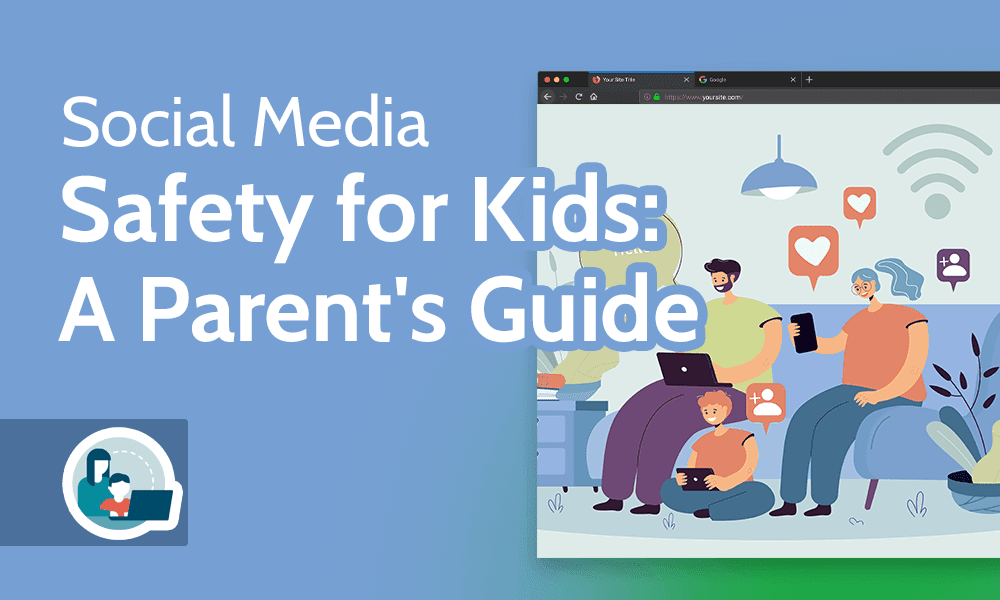
- Why Your Kids Should Use Social Media Platforms
- The Risks of Social Media Sites
- Cyberbullying
- Location Tracking
- Identity Theft
- Hackers
- Predators
- Social Media Addiction
Social Media Safety for Kids: A Parent’s Guide to Protecting Your Children Online in 2022
Children should be taught about the negative effects of social media and how to stay safe when using social networking sites and browsing the internet. Read our parents’ guide to learn how to navigate this arena with your children today.
Social media is a great way to stay connected, but it also presents many dangers to children. The internet can be used to stay in touch with friends and family, learn about new things and more.
But it can also pose threats such as identity theft, falling victim to a phishing scam, cyberbullying on online gaming platforms and more if you don’t know how to protect your kids online. This guide to social media safety for kids will do just that.
Key Takeaways:
- Social media sites make the perfect platforms for online scams by hackers and those with malicious intent, especially for kids and teens.
- Parents should talk to their children about the many risks that come with using social networking sites.
- Kids can be exposed to phishing, violent or sexual content, cyberbullying, invasion of privacy, identity theft, dangerous third-party apps and scams while using social media platforms.
- Talk to your kids about how to avoid revealing too much on the internet and teach them social media safety tips and how to recognize red flags.
As a parent, it’s important to know how to best protect your child online while they’re on social media. You might think that your child is ready to manage their own social media accounts and use them responsibly, but they might not be well informed on the dangers of the internet. That’s why parents should take an active role in staying on top of their children’s online activity.
This guide will show you how to keep your child safe in this brave new world of social media and the internet.
Why Your Kids Should Use Social Media Platforms
Social media platforms have been proven to have positive effects on social and intellectual development in young people. The benefits are clear: The more advanced the technology, the easier it is for children to communicate with those who share their interests and become involved in various activities.
Yet there is also a dark side to social media: Your child may be exposed to sexually explicit content, cyberbullying or harassment. Because of the extent to which we currently depend on social media, it can be called a necessary evil. It is widely used, and your kids will have to familiarize themselves with it someday. From a child’s perspective, social media platforms are unavoidable.
Kids can access social media platforms through their school computers or via their mobile devices. Your kid might be interested in hanging out with friends virtually, or sharing personal interests with their friends and followers. In fact, studies have shown that the popularity of mobile gaming, watching YouTube videos and using social sites increased during the COVID-19 pandemic.
Kids need to be educated about the wide variety of media platforms available so they can make smart choices. Parents should emphasize how various platforms affect the users’ lives differently and help their children understand how each type of site can impact their mental health, values and even friendships.
Yes, the internet is a powerful tool that can greatly enhance the lives of our children. However, it’s important to be aware of the many ways this technology can also be harmful and destructive to their well-being.
The Risks of Social Media Sites
Social media sites pose various risks to your kids. Children can be exposed to inappropriate pictures and other unsettling content, and they can also be approached by strangers online who may try to lure them into dangerous situations.
The risks are even greater if your child uses a tablet or smartphone, as these devices make it easy for children to access social media sites without your knowledge. Below are some of the major risks you need to be aware of.
Cyberbullying
Cyberbullying is harassment that takes place online. Given the increase in the usage of social media, cyberbullying has become more common and more widespread than ever before.
For example, in the first quarter of 2022 alone, Facebook has taken action on 9.5 million instances of bullying and harassment-related content. It can take place on mobile phones, most social media networking sites and even gaming platforms.
Some warning signs of cyberbullying include mean or hurtful things being said about a specific person, often in a public place, with no one stepping up to stop it. Parents should be on the lookout for any sudden changes in their child’s behavior that may signal a problem, such as frequent crying and anxiety, which often go hand in hand with this type of bullying.
Location Tracking
Location tracking is a major risk for children while using social media and other online applications. Most applications enable location tracking by default, especially social media apps that allow you to tag images or videos with GPS coordinates.
This could put your child in danger if they unknowingly post their location on social media, or update their profile picture with a photo of themselves at a recognizable location. With many apps having this feature enabled by default, parents might not even realize it’s happening.
Identity Theft
Identity theft is a crime in which the perpetrator uses fraud or deception to obtain personal information about their victim, and then proceeds to use that information for illegal profit. It often involves assuming the identity of the victim for monetary transactions or committing further fraud using the victim’s personal details.
Techniques such as pretext calling are common, in which identity thieves try to gain information from unsuspecting victims by pretending to be someone with a legitimate reason to call — such as their child’s school or daycare center.
Other methods involve phishing and spam/spoof emails or messages that trick email recipients into clicking on virus-infected links or those that lead to the theft or the leakage of personal information. These can easily be spotted if one is on the lookout for them, which makes it easier to avoid falling prey to this risk.
Hackers
Many people and organizations use the internet to acquire personal information they can use to their own benefit. Skilled and amateur hackers have infiltrated many sites on the internet, including social media platforms.
The threat of cybercrime is real, and it has become an everyday problem. Many people don’t realize it until they get hacked themselves, but protecting yourself from cybercrime is essential for your personal safety.
Thankfully, the risk can be reduced if you don’t click on unknown and unfamiliar links or pictures, and stay off unsafe WiFi connections. You can also protect yourself from hackers by taking backups at regular intervals, installing antivirus software and beefing up your password strength by using a mixture of words and numbers with special characters. A password manager can also help.
Predators
Every day, an estimated 500,000 cyber-predators are active. According to the FBI, more than half of internet sexual exploitation victims are between the ages of 12 and 15. Children are especially vulnerable to being groomed or influenced by adults they encounter online.
Online predators lure children into their traps. They try to convince kids who are young and vulnerable to befriend them, then send them explicit photographs or money. Tragically, some predators even pretend to be teenagers themselves in order to entice their victims even further.
Social Media Addiction
Did you know that 92% of teenagers use the internet every day, and 24% use it “almost constantly”? It’s important for parents to monitor their kids’ time spent browsing the internet and chatting on social media sites.
Being addicted to social media has many negative effects on children, including less time spent with family, friends and real-world activities; higher levels of anxiety; difficult relationships with peers; and a decreased sense of well-being.
By setting limits on how long kids can use the internet outside of school assignments, you can prevent your kids from falling into the trap of using social media sites too much. You can do this by leveraging parental controls on your children’s devices.
8 Social Media Safety Tips
Above all else, it’s absolutely necessary to simply talk to your child about the internet. Communicate with them openly and make it clear you’ll be there for them no matter what happens. They should know they can come to you instead of having to suffer in silence whenever something hurts them on the internet.
Be observant, pay attention to their online habits and try to gently open conversations if you notice a change in your children’s behavioral patterns. Be their foundation of support and not a source of punishment.
Remember that even unconsciously, their behavior is modeled upon yours.
Here are eight additional tips that, together with effective communication, can help you keep your children safe online:
1. Turn On Privacy Settings
Most platforms have parental controls and privacy settings that you can enable for your children at all times.
Also, teach them to use strong passwords and avoid friend requests from people they don’t know. This will help keep hackers from breaking into their social media accounts and hijacking them for illegal content or activities.
2. Know the Platform’s Age Requirements
Encourage your children to follow the minimum age requirements of the social media platforms they create their accounts on. If they are too young and want a safe space to explore what social media is, sit down with them while logged in to your own account and show them around. Assuage their curiosity instead of pushing them to make secret accounts of their own.
For instance, on Facebook and Instagram, the minimum requirement to use the platforms is 13 years of age due to the Children’s Online Privacy Protection Act (COPPA) which sets out regulations for online platforms to safeguard kids browsing online.
3. Get an Account for Yourself
Create a social media account for yourself, so you can stay connected with the beautiful world your child is building for themselves online. You can follow their progress while ensuring they are doing well and staying safe.
4. Verify Your Child’s Friends and Connections
While the world of social media can be exciting and fun, it can turn into a disaster if one engages with malicious sites or commits online fraud. Take a closer look at your kids’ connections on the social media platforms they use, and ask them to get rid of the fake ones.
Parents can then help their children identify fake social media friends by educating them about the kinds of behaviors that are appropriate for real friendships. Teach them to remain cautious when talking with people they meet online, even if those people seem friendly. Remind them that real friends should not ask them to do anything that makes them uncomfortable.

5. Be Careful With Posting
Kids should be careful about what they post on social media and parents should help guide them. A lot of teens post things that seem funny in the moment but can have serious consequences later. This could be anything from extreme prank videos to making fun of someone online. Children should know that anything they post online can be seen by anyone, even if they delete it later.
That’s why it’s important for parents to talk with their kids about what they post online and how it can affect them. Parents should also know where their kids are getting their information, especially if they are not old enough to understand the consequences of posting things on social media.
They should also help their children understand the possible consequences of their actions. Posts can result in the loss of future jobs, getting bullied at school, or identity theft from unwittingly sharing personal information. The internet never forgets, so it’s important to teach children to think before posting anything on social media.
6. Talk to Your Kids About Social Media
Believe it or not, having important conversations with your kids can go well, but only if it’s truly a two-way discussion. If you talk to kids with a close-minded tone and do not pay attention to what they have to say, it will only convince them not to trust you with real problems.
7. Set a Good Example
Children and teenagers are often tempted to share inappropriate content online. Parents can help their children understand the effects of what they post, and that people can be hurt even by things that are meant as a joke. They should also teach kids about issues like privacy and cyberbullying.
The best way to teach your kids about appropriate content sharing on social media is by setting your own example. If your children see you interacting with other people respectfully (both online and in person), they will follow suit. This also gives you a basis to discuss what constitutes an appropriate photo or post.
For example, you can enhance their creativity and learning by sharing artistic content, news or current events and engaging in productive discussions with educators or peers.
8. Spend Time Offline
It’s important for parents and children to spend quality time together without the internet. Host board game nights and baking sessions, so they understand that life isn’t centered around the digital world. Don’t allow the use of cell phones at the dinner table, take photos without the intention of posting them and make the most of the family moments you have with each other.
Final Thoughts
Social media can be a scary place to deal with on a daily basis, but as long as you’re acquainted with your child’s online life, everything will be fine. Communicate with your kids and teach them how social media can be used as a tool that introduces them to a world full of possibilities.
If you have any suggestions on social media safety for kids and teens, let us know in the comments. We also invite you to share this blog with parents who want to keep their kids safe from the ugly side of the online world. As always, thank you for reading.


